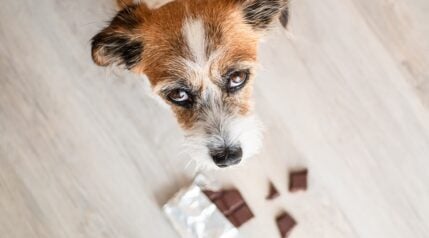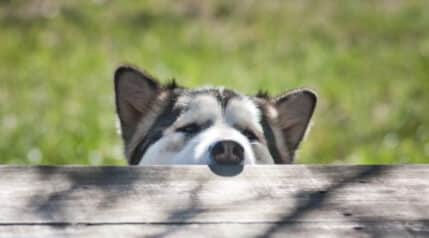Did your dog just surprise you by devouring a bird? Bird-watching is a hobby enjoyed by many, including our dogs. Unfortunately, dogs will often have other things on their mind when they are closely observing a bird in the garden. You may find that “watching” quickly turns into stalking and then catching! Dogs eat all sorts of things they aren’t supposed to, so a bird should come as no surprise.
This drive is due to the fact that some family lines of dogs were bred as bird hunters. Think about the German Shorthaired Pointer, for example. Their pointing stance is instinctual and was historically used to direct hunters to the location of wild game. Labradors are another fowl-retrieving breed, and these pups just have a natural instinct for birds! Some pet dogs will stalk birds even if they haven’t been trained!
So, it is completely understandable that some dogs will have a fascination with our feathered backyard visitors. Unlike mice, in most cases, those clever birds are able to fly away quickly when faced with a curious canine. In rare cases, however, your dog may be able to catch a bird and eat them. So what should you do when that happens?
Should I Be Concerned?
In the majority of cases, your dog will be fine if he eats the odd bird. Unlike toxic dangers from certain amphibians, the dangers posed by birds are intestinal blockages and bacterial diseases. Usually, the bones and other parts of a bird won’t cause any harm, especially if the bird is fresh. Many people choose to feed their dogs raw, and their digestive systems are equipped to handle uncooked bones.
It’s when bones get cooked that it really brings trouble. Chicken bones from a cooked chicken run the risk of intestinal puncture, which can be fatal if not treated. The good news is that more often than not if your pup catches the odd sparrow or bluejay and eats it, your pup should be fine.
You’ll want to contact your vet as a precaution and watch your canine companion’s behavior over the next 48 hours. Usually, any signs of an intestinal blockage will appear during this time. It may be beneficial to have an X-ray done, which is why we recommend contacting your vet right away.
Will My Dog Catch A Disease?

It is unlikely that your dog will catch a disease from consuming one bird, especially if they are healthy otherwise. However, the risk is present and exists whether your pup eats just the head of the bird or the whole bird.
It is best to remain suspicious of the possibility of an infectious disease having been present in a bird if your dog is unusually successful at catching one. Wild birds are typically a lot faster than most dogs, especially ones that aren’t trained birders.
An infected bird might be more lethargic if ill. In fact, this may be the reason it’s possible for your pup to catch it in the first place! If you notice some dull-looking birds in the area, stay far away and keep an extra-close watch. Sick birds can more easily be nabbed for a snack. Here are the two diseases you’ll need to be most watchful of.
Salmonella
Wild birds will often carry salmonella in their gut. This is a bacteria that is found in undercooked poultry and is one of the reasons it is so important to clear all in-contact surfaces when working with raw chicken. Thankfully, studies have shown that dogs will often remain in good clinical health even if they catch Salmonella bacteria.
Still, getting sick is not impossible, and it’s a good idea to monitor your pup closely during the 48-hour period after consumption. Look out for vomiting, diarrhea, and changes in appetite. If you notice these or any other sudden changes in behavior that last longer than 24 hours, it’s best to make an appointment with your veterinarian for a check-up.
Don’t forget that humans can catch salmonella. Your furry friend can then pass it on to you! The very elderly or very young are more at risk, as are those who are immune-compromised for another reason. Try not to let your pup lick faces, and teach children good hygiene around pets.
Chlamydia
Chlamydia is another type of bacteria that dogs can pick up from birds, particularly if they are in contact with their feces. This type of chlamydia has the scientific name “Chlamydia psittaci”. It is a respiratory bacteria and cannot be passed from dogs to humans. The symptoms of Chlamydia in dogs include panting, difficulty breathing, and irritated eyes.
If you notice these symptoms after having had an interaction with a bird or eating a bird, inform your veterinarian and make an appointment. If your vet suspects Chlamydia, she will take swabs to confirm the diagnosis. Fortunately, this bacteria can be treated with a course of antibiotics.
Could Pet Insurance Help?
If your pet insurance covers exam fees and your dog needs to be examined, there is a good chance your policy will reimburse those costs based on your policy details. However, if you are a new customer, vet expenses will not be covered until after your policy’s defined waiting periods, so signing up once you have an existing health concern is not going to help this time. Pre-existing conditions are not covered by any current pet insurance plans.
This is why it is a great idea to sign up for a pet insurance policy when your pet is young and relatively healthy to ensure you will be covered when you need it most.
Can My Dog Digest A Bird?

Most parts of a bird that get eaten will be able to pass through the gut without causing any harm. Bones and feathers are, however, indigestible. If your pup chooses to dine on a tiny songbird, it is unlikely that any of the bones will cause an obstruction due to their size. However, some birds are quite large. If your dog manages to get a hold of one that is seagull-sized, they may end up with a blockage.
What About Bird Bones And Feathers?
A bone can cause problems even before it reaches the stomach! You may notice excessive salivation or coughing repeatedly soon after eating. This can indicate that a bone got stuck somewhere in the mouth or the throat, and you should seek out a veterinarian’s help immediately. They can diagnose the obstruction and figure out the best way to relieve it.
It can take up to 48 hours for signs of an obstruction further down in the gut to become apparent. Look out for vomiting, diarrhea, changes in appetite, or abdominal pain, and make a trip to the vet if they don’t resolve within a few hours. Feathers are less of a problem than bones when it comes to gut obstructions.
They are often delicate enough to pass through without any issues. You’ll just get to enjoy a few whole feathers present in your dog’s poop! Even so, if you have any concerns about something that your pup has eaten, contact your vet. They will be able to advise on how best to proceed.
How Should I Clean Up After My Dog?

After your dog has eaten a bird, you’ll probably want to steer clear of any doggie kisses for a while, especially with the risk of salmonella! The saliva in their mouth will do a good job of keeping things clean but to get the mouth properly rinsed, encourage your pup to drink some water. You can do this by filling his bowl with fresh water and showing it to your dog. Depending on how messy they got during the experience, a bath at home may definitely be in order.
Splashing the water in the bowl may help to catch his interest. A little bit of chicken broth in the water can make it more enticing, but ensure that you completely clean out the water bowl soon after, as chicken broth sitting in a bowl is a perfect breeding ground for bacteria!
Another way of keeping the mouth fresh is by using a dental chew. Some chews will even contain a mint flavor that will mask bad breath. Of course, the best way to keep your dog’s mouth clean is by brushing the teeth using dog-safe toothpaste. This will not only help freshen the breath and clean the mouth but will also keep the teeth and gums healthy.
How Can I Stop The Behavior?
There are certainly many reasons not to want your pup to get involved with bird-catching! You can discourage bird stalking behavior by catching your dog’s attention (you can try saying their name) as soon as you notice that they are interested in a bird. When they look at you, give praise or offer a reward. This will not only break their focus on a bird but will reinforce re-call training.
For dogs that are especially bird-motivated, it might be best to keep them on a leash or monitored closely. This is especially true if you live in an area where they will have access to birds. Keeping Fido busy with a game of fetch or other activities is a great way to distract from any wildlife that may be in the immediate area. One extra safeguard against bird-grabbing behavior is to fit a set of bells on your dog’s collar. The bells will act as a warning and give birds in the area extra time to get to safety.
Final Thoughts
Especially with all the potential risks involved, you will want to be prepared the next time your dog starts eyeing up a bird. It is best to keep dogs and wild birds from mixing to keep you, your dog, and local ecosystem safe. However, if your dog does catch and eats a small songbird, it’s unlikely they will come to any harm. You can usually monitor them at home and call the vet only if you see symptoms.






Thank you for this article. I’m slightly concerned since my dog ate part of one last night.